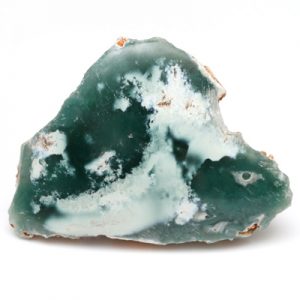Mtorodite
Mtorodite (also Mtorolite) is a trade name (marketing term) for a rare green, chromium-bearing variety of Chalcedony, named for the locality where it was discovered near the mining town of Mtoroshanga, Mashonaland West, Zimbabwe. Mtorodite, also known as Mtorolite or Chrome-Chalcedony, is a variety of Chalcedony colored by small quantities of chromium. Mtorodite is similar in appearance to the better known Chrysoprase, but differs in that Mtorodite is colored by chromium (as chromium oxide) while Chrysoprase is colored by nickel. The two can be distinguished with a Chelsea color filter, as Mtorodite (chrome Chalcedony) will appear red, and Chrysoprase will appear green. Mtorodite, unlike Chrysoprase, may also contain tiny black specks of chromite. Mtorodite, along with Agate, Carnelian, Chrysoprase, Heliotrope (blood stone), Onyx and others, are all varieties of Chalcedony which is a cryptocrystalline form of Quartz. Chrome Chalcedony from Bolivia is often called “Chiquitanita” after the Chiquitos Provnce where it is found.
Chrome Chalcedony was widely used in jewellery and seals throughout the Roman Empire. Its earliest use appears to have occurred around the first century AD and then disappeared from use sometime in the second century. The source of this material is unclear. Pliny the Elder described it as coming from India, but no deposits have been found there. It may have come from Anatolia (in modern day Turkey) where deposits are known to exist. Chrome Chalcedony was not “discovered” again until 1955 near the mining town of Mtorochanga in Zimbabwe. A small number of other sources of chromium-bearing Chalcedony have been reported since the mid-1980’s. It has also been discovered in western Australia; Saricakaya, Eskisehir, Central Anatolia, Turkey; Ural mountains, Russia and from Rincón del Tigre, Chiquitos Province, Santa Cruz Department, Bolivia.
| Chemical Formula: | SiO2 + Cr |
| Silicon Dioxide (Quartz) + Chromium |


